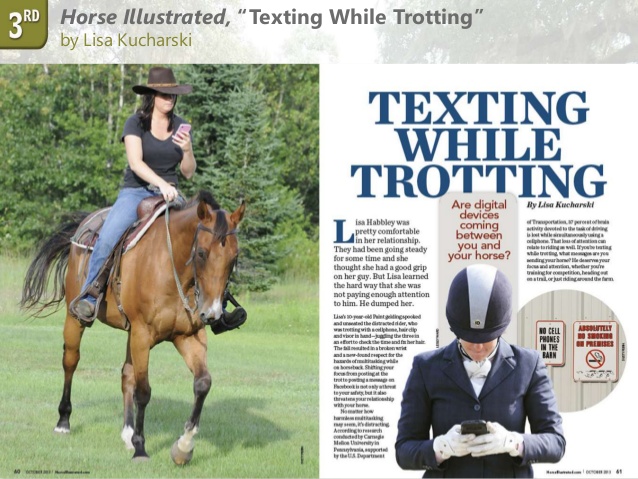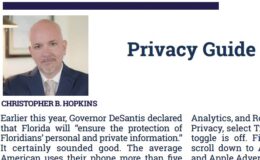New York Court Horses Around With Facebook Discovery (Forman v. Henkin)
- By : Cbh
- Category : E-discovery, Social Media

The recent December 17, 2015 opinion in Kelly Forman v. Mark Henkin (NY Appellate Div., First Dept. 2015), provides an otherwise unremarkable discovery opinion except for the dissent, which argues that New York courts are imposing a higher burden on social media discovery. This has led to a fair amount of hand-wringing and posts by law firms claiming to have experience and insight in this area.
Here are the facts: the Plaintiff was riding Defendant’s horse in Westhampton when the stirrup broke and Plaintiff fell, suffering personal injuries. She sued Defendant, alleging that he had failed to properly prepare the horse for riding. During the course of litigation, Defendant requested an “unlimited authorization” to access Plaintiff’s Facebook content. The trial court ordered production of all Facebook photos which the Plaintiff intends to introduce at trial; all post-accident photos posted on Facebook; and authorizations to see Facebook posts. The appellate court, in this opinion, vacated the last two requirements. The end result — produce photos which you intend to use at trial — is not earthshattering in any jurisdiction.
From the opinion, it appears the Plaintiff had a Facebook account before and after the accident but, during litigation, she deactivated the account. She claims that she used Facebook less after the accident. Part of her claim was that her “social network” reduced after the accident (unclear if this is her in-person network or virtual network). Plaintiff claimed that she remembered very little about what was on her Facebook account. Defendant had little information from the public portion of her Facebook account (“an old photo”) and the opinion is silent whether Defendant developed much about the Facebook account in the Plaintiff’s deposition. It appears the thrust of their claim was that they believed that they could challenge her credibility based on the Facebook content.
In short, the appellate court determined that “some threshold showing [was required] before allowing access to a party’s private social media information.” Here, the Defendant had little to nothing. Neither party challenged this legal precedent. Neither party asked for relief in the form of an in camera inspection. Given that the facts were not well developed in the opinion, it would appear that this case would be fairly unremarkable. Except there was a dissent.
In the dissent, Judge Saxe proposes that “we reconsider this court’s recent decisions on the subject” specifically relating to the requirement of a factual predicate and an in camera inspection. Taken in reverse order, the majority and dissent disagree whether an in camera inspection is required under New York precedent in these situations. Regardless, the majority seems to have the upper hand as it relates to this case since neither party asked for an in camera inspection at the trial or appellate level (hence none was ordered).
As for the requirement of a factual predicate before permitting social media discovery, Judge Saxe avers that “the procedure we are currently employing stands in marked contrast to the standard discovery procedure” and that the standard, “material and necessary,” has previously been liberally construed in determining whether to permit “regular” discovery and that it only requires a “reasoned basis” for items which “bear on the controversy” or is at least likely to lead to discoverable evidence. The dissent points to Giacchetto v. Patchogue-Medford Union Free. Sch. Dist (ED-NY 2013) for support.
ERRANT DISCUSSION
- Social media discovery precedent (here in Florida) still remains fairly sparse and, for the case law which does exist, there is a body of opinions that there must be some factual basis to ask for social media access to avoid a fishing expedition (some not all courts take this position). This can be accomplished by various steps but it requires defense counsel (typically defense counsel, at least) to follow the right steps to set up the factual basis. Here, either counsel apparently had nothing factual to work with and/or failed to do the homework and follow the steps to create a predicate (see, Ten Steps to Facebook Discovery In Florida 2015).
- If a party is going to argue that they want social media access to challenge the other side’s credibility, an in camera inspection is often your best move since this argument, alone, is not often successful. But the court might find something for you. Alternatively, as for a special master or even a social media private special master to review.
- The dissent has picked upon on a muted distinction between how courts treat social media discovery vs. how it treats regular discovery. Anecdotally, I have found that judges recoil and/or take special interest when the discovery dispute involves new technology toys, whether it be social media or iphones. Litigants and jurists are better equipped to assess what is fairly in bounds for discovery if they remove the “e” before “e-discovery” and ignore placing “i” before words like “phone” and just focus on the content and not where or how it exists. The electronic nature of social media seems to be a big distraction which leads, sometimes, to awkward and inconsistent results. But this does not result in the need for an overhaul of discovery law, just better discovery by counsel, better arguments of the application of existing discovery law, and a clear assessment by the courts.
- The dissent, without coming out and saying it, is right that you really are not “discovering” something if you already have a factual predicate that it exists. Plaintiffs get to prepare their cases and, with that, sharp plaintiffs are buttoning up their social media accounts so that any possible thread is not dangling from a private account which could be pulled to open up the entire fabric of the Plaintiff’s account. Taken to its extreme, if the would-be Defendant doesn’t know the lawsuit is coming and doesn’t, prior to suit, preserve copies of the Plaintiff’s public Facebook content (or find it elsewhere), a well-coached Plaintiff could close up the public portions of the account and pull up the gates leaving the Defendant without a toehold of a factual predicate to enter the gates of Facebook. Advantage, Plaintiff, if the courts are so strict in this approach.
- Here in Florida, we still have case law holding that diaries are fair game.
- The dissent footnotes that de-activating a Facebook account is not a barrier to obtaining discovery from Facebook and that deleting the account may be spoliation.
- Note that the trial court had ordered the production of photos except “nude” and “romantic” photos. Unclear if this was an issue in the case or just a blanket
prophylacticdiscretionary limitation. After all, nude pictures could show injuries…
Some further reading:
Discovery of Facebook Content in Florida Cases (2012)
Defendants Want Social Media Discovery, Plaintiffs Want E-Discovery (2013)
Photo credit: American Horse Publications (the photo is not related to nor does it depict these litigants. Simply used since the texting-while-horse-riding issue came as a bit of a surprise!)


